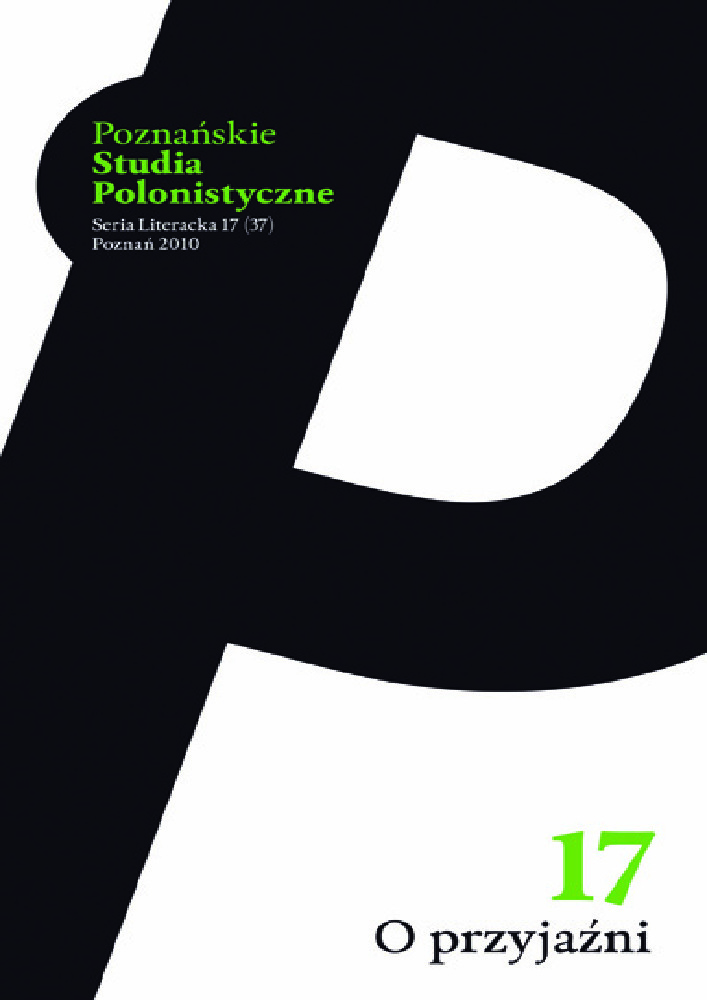Abstract
For Aristotle, the bond of a valuable friendship was created for the sake of its own value of giving friendship or the experience it furnishes, and not for the sake of expediency or the sheer joy of sharing friendship. A sustainable friendship basically finds its roots in what a human being is. Hence, it is loving rather than being loved that makes people real friends, ethically perfect. Biblical authors knew that a true friendship was difficult to obtain and that it could easily be lost. Thus, for their readers, to observe their advice means to obtain valuable hints and guidelines and to be protected from disillusionment. These guidelines had been drawn by them from the experience of everyday life, as a result of watching and drawing conclusions from what they saw following different man’s response to different situations. Might they have been victims to unjust action themselves, or had they committed something that made them feel ashamed, but kept that it in their mind as a warning to their prospective readers? Whatever the answer is, they managed to draw conclusions from the experience that, ultimately, could be helpful in making those who would perpetrate something that would hurt or kill a friendship repent.
References
Barton J., Buddiman J., The Oxford Bible Commentary, Oxford–New York 2007.
D’Hamonville D.M., Les Proverbes, w: La Bible d’Alexandrie, Paris 2000, s. 179–180.
Di Lella A.A., The Wisdom of Ben Sira. A New Translation with Notes by P.W. Skehan. Goldingay J., Psalms I. Psalms 1–41, Grand Rapids 2006.
Gauthier R.A., La morale d’Aristote, Paris 1958.
Höffe O., Aristoteles, München 1996.
Introduction and Commentary, New York–London–Toronto–Sydney–Auckland 1987.
Irwin T.H., Permanent Happiness: Aristotle and Solon, „Oxford Studies in Ancient Philosophy” 1985, nr 3, s. 89–124.
Kraus H.J., Psalms 1–59. A Commentary, Minneapolis 1988.
Langkammer H., List do Efezjan, w: Pismo Święte Starego i Nowego Testamentu w przekładzie z języków oryginalnych, Lublin 2001, s. 89.
Lelièvre A., A. Maillot, Commentaire des Proverbes III, Chapitres 1–9, Paris 2000.
Longman III T., Proverbs (Baker Commentary on the Old Testament Wisdom and Psalms), Grand Rapids 2006.
Meinhold A., Die Sprüche, t. 2, Zürich 1991.
Monan J.D., Moral knowledge and its methodology in Aristotle, Oxford 1968.
Nawrot J., Przyjaźń w „Etykach” Arystotelesa, w pismach mądrościowych Septuaginty oraz w Nowym Testamencie, Poznań 2004.
Potocki S., Rady mądrości, w: Jak rozumieć Pismo Święte, t. 5, Lublin 1998, s. 208.
Ravasi G., Psalmy. Psalmy 1–19 (wybór), cz. 1, Kraków 2007.
Scott R.B.Y., Proverbs, Ecclesiastes, New York 1965.
Synowiec J.S., Mędrcy Izraela, ich pisma i nauka, Kraków 1997.
Tronina A., Psałterz Biblii greckiej, Lublin 1996.
Waltke B.K., The Book of Proverbs 1–35, Grand Rapids 2004.
Wojciechowski M., Księga Tobiasza, czyli Tobita, t. 12, Częstochowa 2005.
License
Authors
Authors of texts accepted for publication in „Poznańskie Studia Polonistyczne. Seria Literacka” are required to complete, sign and return to the editor's office the Agreement for granting a royalty-free license to works with a commitment to grant a CC sub-license.
Under the agreement, the authors of texts published in „Poznańskie Studia Polonistyczne. Seria Literacka” grant the Adam Mickiewicz University in Poznań a non-exclusive, royalty-free license and authorize the use of Attribution-NoDerivatives 4.0 International (CC BY-ND 4.0)Creative Commons sub-license.
The authors retain the right to continue the free disposal of the work.
Users
Interested Internet users are entitled to use works published in „Poznańskie Studia Polonistyczne. Seria Literacka” since 2016, for non-commercial purposes only, under the following conditions:
- attribution - obligation to provide, together with the distributed work, information about the authorship, title, source (link to the original work, DOI) and the license itself.
- no derivatives - the work must be preserved in its original form, without the author's consent it is not possible to distribute the modified work, such as translations, publications, etc.
Copyrights are reserved for all texts published before 2016.
Miscellaneous
Adam Mickiewicz University in Poznań retains the right to magazines as a whole (layout, graphic form, title, cover design, logo etc.).
